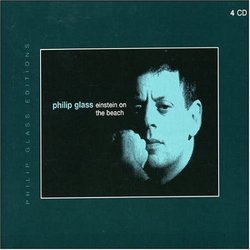| All Artists: Michael Riesman, Philip Glass Ensemble, Iris Hiskey, Marc Jacobi, Phillip Gavin Smith, Bruce Burroughs, Connie Beckley, Dana Reitz, David Woodberry, Forest Warren, Frank Conversano, George Andoniadis, Grethe Holby, Jeannie Hutchins, Marie Rice, Richard Morrison, Ritty Ann Burchfield, Ronald Roxbury Title: Glass: Einstein on the Beach Members Wishing: 2 Total Copies: 0 Label: Sony Bmg Europe Original Release Date: 1/1/1993 Re-Release Date: 1/21/1993 Album Type: Box set, Import Genres: Dance & Electronic, Classical Styles: Techno, Opera & Classical Vocal Number of Discs: 4 SwapaCD Credits: 4 UPCs: 5099708797027, 667344743729 |
Search - Michael Riesman, Philip Glass Ensemble, Iris Hiskey :: Glass: Einstein on the Beach
 | Michael Riesman, Philip Glass Ensemble, Iris Hiskey Glass: Einstein on the Beach Genres: Dance & Electronic, Classical
|
Larger Image |
CD Details |
CD ReviewsThe Tommyknocker of our soul Jacques COULARDEAU | OLLIERGUES France | 09/29/2007 (5 out of 5 stars) "In this opera Philip Glass pushes the two heritages he is using and referring to to an extreme that leads his music beyond classification, hence projects it into pure creativity. He uses the Ravel's Bolero genre or form so far and so amplified that we reach a totally hypnotic state. With very few notes, with extremely reduced musical phrases, with very few syllables and very short texts he builds many pieces that are rotating and spinning around repetitive nodal points in such an intricate manner that we just dive into them and enjoy the flow and flux, the ebb and reflux of the music. The second heritage is that of amplified music, is that of black rhythmic multiplicity. But instead of two rhythmic lines like in jazz or vodun, he plays on a lot more that are superimposed, intertwined or even crisscrossed or merged into an ever changing continuity, the many-faceted and eddied running water of a mountain brook or a major river when it is at its highest level. There too we have to keep still and quiet and silent in our nutshell of a boat and let it go down the current without any resistance or attempt at diverting it. We are at the mercy of these rhythmic lines that are emphasized and multiplied and amplified by the harmony of the notes behind into some rhythmic harmony. An absolute miracle. An absolute wonder. An absolute transfiguration. The joining of these two traditions and their development produces a music that reflects our modern world which is made of a constant and accelerating flow of sounds, information, communication, noise, messages. It is the world of absolute post-modernism where nothing is stable except in its very instability, nothing is permanent except in its very impermanence. There is no more perspective and depth. Movement is our very perambulating nature proceeding through a world of sounds that wraps us up in a blanket of warm wool that is homogeneous in texture and ever varied ever varying in its many threads and woven yarns. And that is the meaning of the title. Einstein opened the door to this world with his theory of relativity that ushered us into both the cosmos and modern physics. The beach is that vast expanse of infinite small grains of sand, each one being different from all the others and yet all of them being just of one essence. Glass reaches the relativity of the cosmos and the uniformity of the essence of sand, or if your prefer the relativity of sand grains on a beach and the uniformity of cosmic emptiness. Dr Jacques COULARDEAU, University Paris Dauphine, University Paris 1 Pantheon Sorbonne & University Versailles Saint Quentin en Yvelines " Unusually brilliant................ Sam | Seahurst, Washington | 09/14/2007 (4 out of 5 stars) "This is a bizarre and relentless opera-as the surreal title implies, more dream than drama. Where the earlier recording had an abrasive edge, this new one is more refined, melding the different elements, electronic alongside acoustic, more subtly and persuasively than before. Even so, the first train episode, over 20 minutes long, remains mind-blowing in its relentlessness. The impact is heightened by the vividness of the recording, with spoken voices in particular given such presence that they startled me as if someone had burst into my room. The vision remains an odd one, but with a formidable group of vocalists and instrumentalists brilliantly directed, often from the keyboard, by Michael Riesman, the new recording certainly justifies itself."
|

 Track Listings (3) - Disc #1
Track Listings (3) - Disc #1